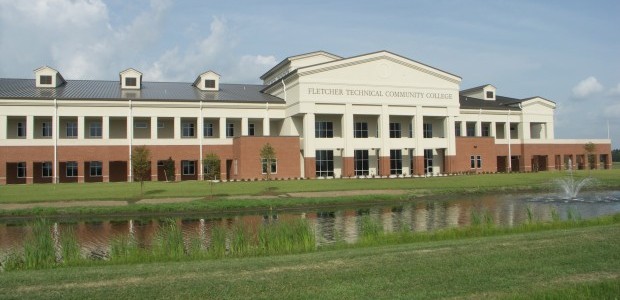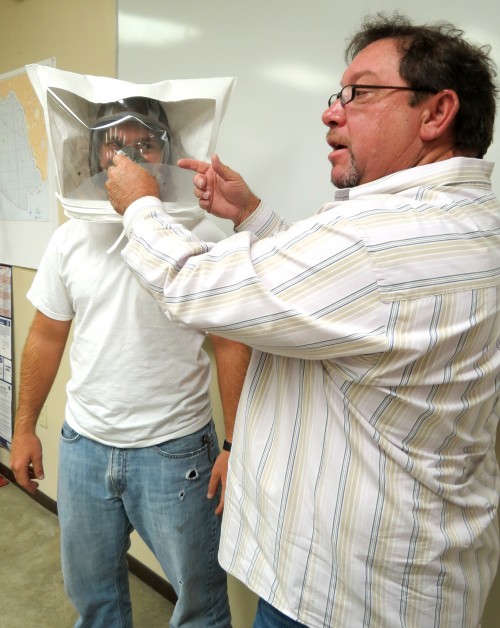
Locals make the grade: Administrators tout public education as making progress
November 13, 2012
Technical training tells trend
November 13, 2012Despite more than $10 million in budget cuts since 2008, Nicholls State University is pushing ahead by expanding its online course offerings, graduating larger classes and improving the campus’ infrastructure.
“We have had a strong year of success at Nicholls,” said university president Stephen Hulbert. “For the third year in a row, we have set records with our graduate numbers. We know we are doing our jobs.”
According to Louisiana Board of Regents figures, 41.88 percent of 2005 Nicholls first-time freshmen graduated from Nicholls or another state institution within six years of starting school. The figure also put Nicholls’ graduation rate as one of the highest among the state’s regional universities.
“This (rate) is good for a regional university,” Hulbert said. “We have lots of first-generation college students, and they are able to balance family, work and other obligations. We also changed from an open-admissions policy to a selective-admissions policy, so that is also helping to increase the rate. We are producing quality students.”
Nicholls, which is one of more than 480 public four-year colleges and universities taking part in the national “Project Degree Completion: A Public University Initiative” pledge, awarded 1,263 degrees during the 2011–12 academic year.
On a more specific level, Nicholls’ student athletes are also graduating at a higher rate, according to statistics released by the National Collegiate Athletic Association. Sixty-eight percent of Nicholls’ student athletes who began college in 2005 completed their degrees within six years of starting college.
“We are third only to Louisiana Tech and Louisiana State University,” Hulbert said. “We are proud of that, especially since the national average is 38 to 40 percent. We are proud of our coaches and athletes. The athletes balance class, sports, work and family. They have great discipline.”
These growing numbers of graduates will also find more and more programs to major in now that Nicholls has added the maritime management program, a concentration in business management, and the Bayou Studies concentration for culinary students. In the spring, the university will also begin offering a masters program for nursing students.
In addition to expanding graduate numbers and programs, Nicholls has also increased the number of buildings on campus with the construction of the Harold J. Callais Memorial Recreation Center and the soccer field complex.
“None of the funding for these new buildings came out of our operating budget,” Hulbert said. “People think, ‘Why are they building things with all the budget cuts?’ This money came from self-assessed fees.”
The school has also secured $8.2 million in capital outlay for its new culinary building, the only new building to be constructed in 2013.
“This department is growing rapidly,” he said.
The school’s culinary department is not the only one growing in leaps and bounds.
The number of students majoring in petroleum safety and services, a division of the school’s applied sciences department, has 368 students, an increase of 100 students since 2011.
“It’s no surprise that the department is burgeoning with the current economy,” Hulbert said. “Students want jobs that pay well.”
“There has been a drastic increase in department,” said department head Dr. Balaji Ramachandran. “In this bad economy, people want better jobs. Petroleum safety is growing fastest. Safety became paramount after the BP oil spill. I want all of the applied sciences concentrations to grow, but trends indicate that safety will grow the fastest.”
According to Ramachandran, who has been with Nicholls for nine years and department head for two years, graduates in this field start out making $60,000 and can earn up to $90,000 if they work offshore.
“That is pretty good in this bad economy,” Ramachandran said. “We are getting calls right now for new students who want to join in the department. We usually don’t see that until fall.”
The applied sciences department is also home to the state’s only geomatics program, a concentration that is also drawing in a good number of students within the state.
“We are keeping up with people’s demands for these degrees even with the budget cuts, but there is only so much we can do,” Ramachandran said. “We are doing more with less. I am proud that my department is the second largest science department. We have had no raises in six years, and we are doing our work with the hope that things will get better. We have no travel budget for students and for teachers to attend workshops. There is no faculty development, and a department is only as good as its faculty. There are lots of advances in these fields that our teachers need to keep up with. We need a good, educated workforce.”
Ramachandran credited industry donations and scholarships from organizations like the Louisiana Society of Professional Surveyors a $400,000 Board of Regents grant that was used to build three new labs – two for petroleum and one for geomatics – with helping keep the department growing.
“Geomatics gets awesome donor support,” Ramachandran said. “The faculty has also helped to bring in $2.5 million in equipment with grants. We try to get industry partners, not ask the government for money.”
Starting next spring, Nicholls will begin offering seven degree programs totally online.
“We already offer more than 100 classes online, but now students will also be able to complete all 120 degree hours online,” said Laynie Barrilleaux, vice president of academic affairs. “Students will be able to earn Bachelor of Arts degree in history, English or sociology or a Bachelor of Science in general studies, general family and consumer sciences, nursing or business administration.
Technology is also helping the universities education majors.
“Through Colonel Chat, our education majors are communicating with elementary school students from South Terrebonne Elementary through online videos,” Barrilleaux said. “The are hosting tutoring and reading lessons online in virtual classrooms. It’s a service learning program.”
“What we have done with the resources we have is phenomenal,” she said. “I am overwhelmed by the dedication of this university to stay open and move forward despite financial struggles.”
Like Barrilleaux, Hulbert is optimistic about the school’s growth in tough times.
“We are doing the best we can with what we have,” Hulbert said. “It is through the hard work of our faculty and staff that we are surviving this difficult time. Nicholls’ will continue to do its job. We are committed to the region but, with what is going on in Baton Rouge, it is hard to project the future.”
Michael Gautreaux, assistant professor, safety technology program coordinator and safety technology and petroleum services professor, conducts a respirator fitting on freshman petroleum safety student Aaron Richard. Richard is from Thibodaux.











